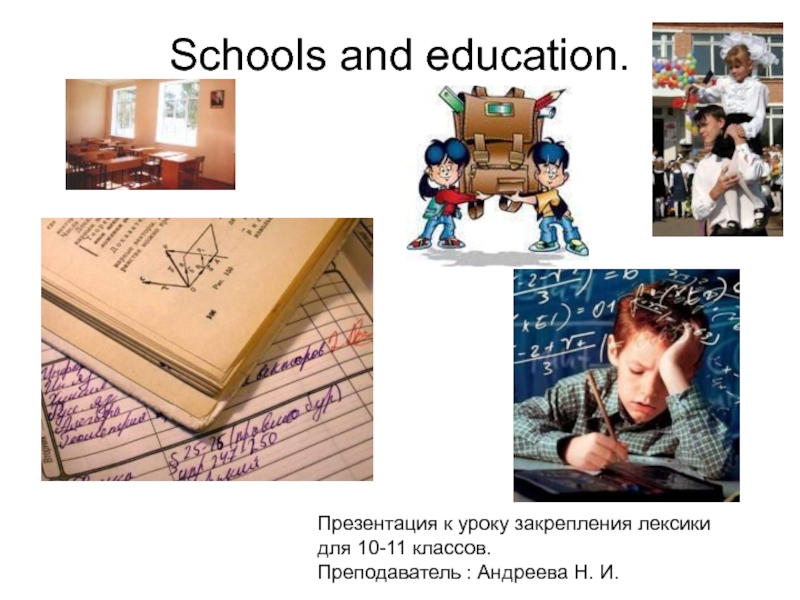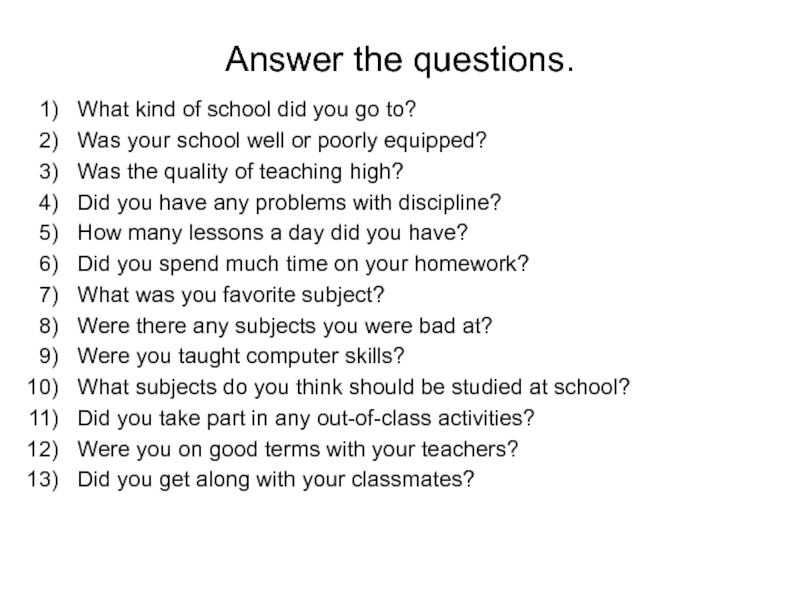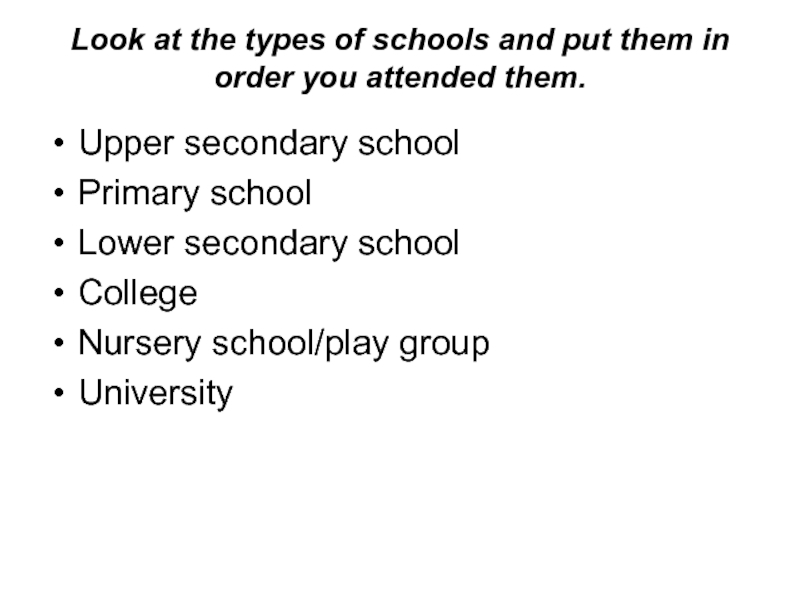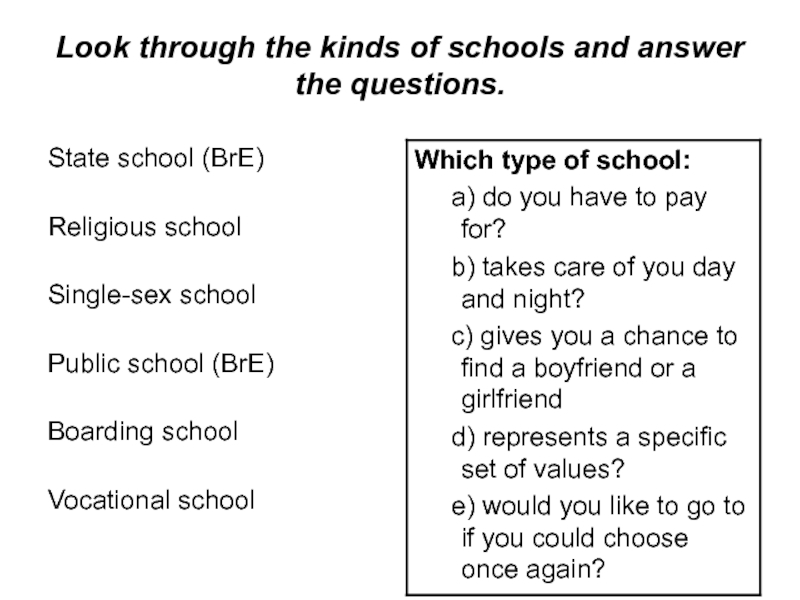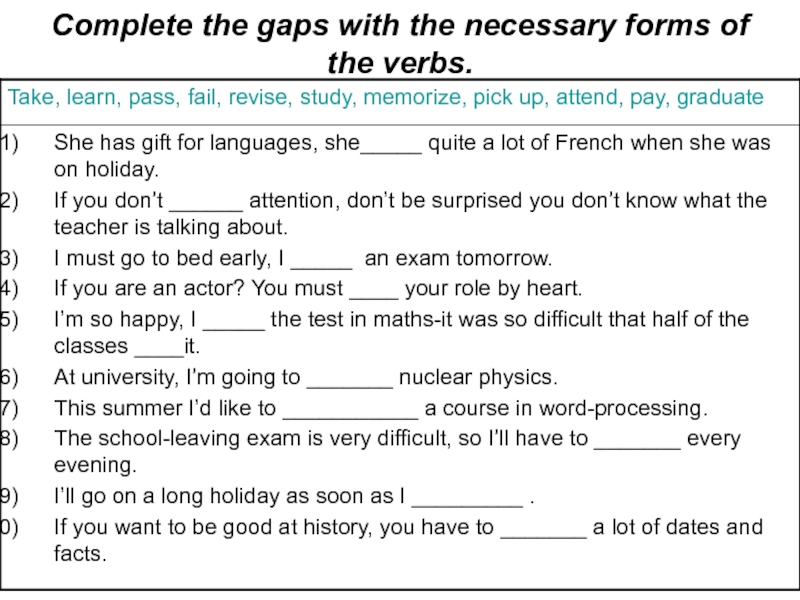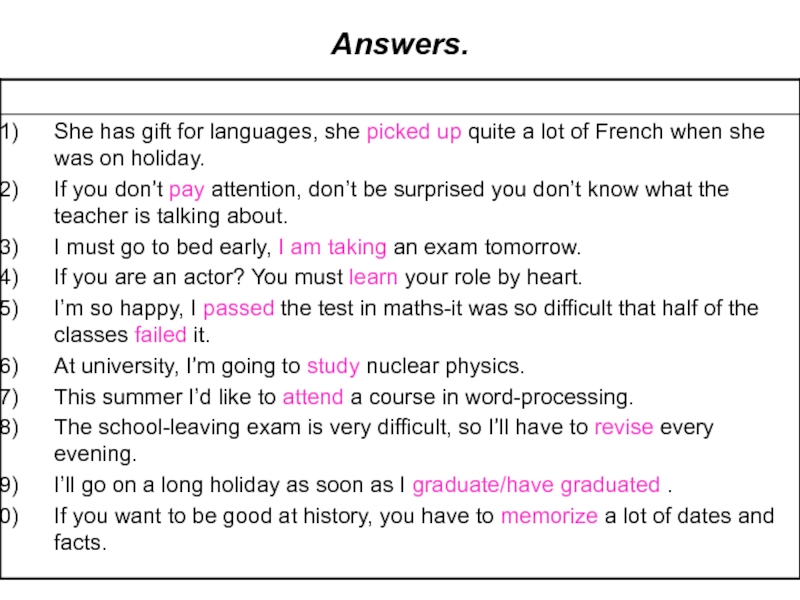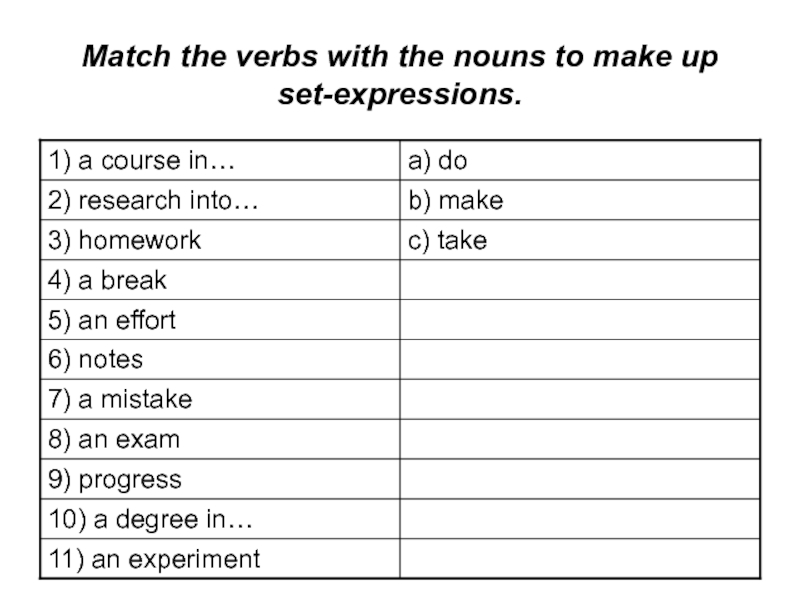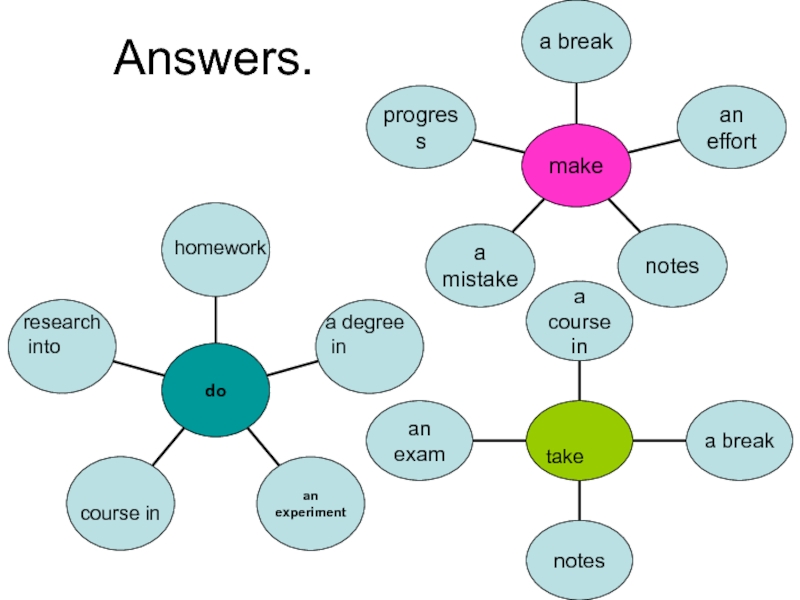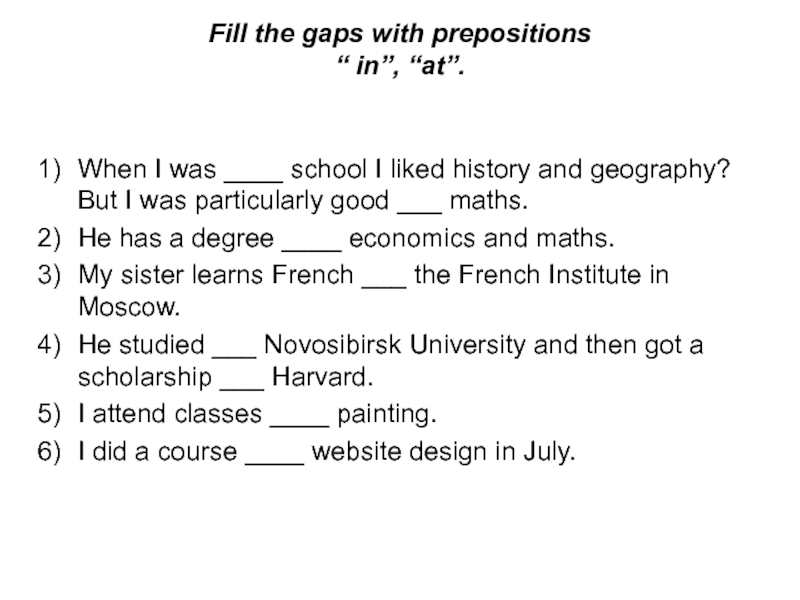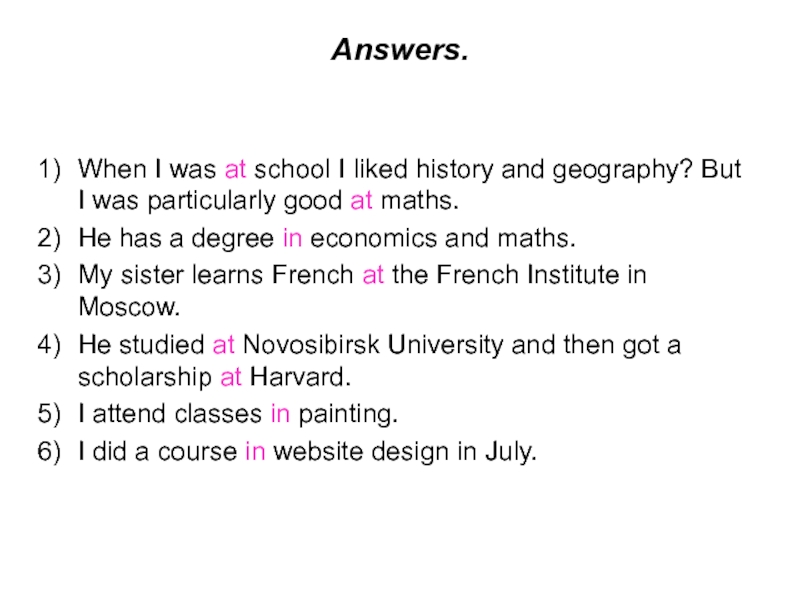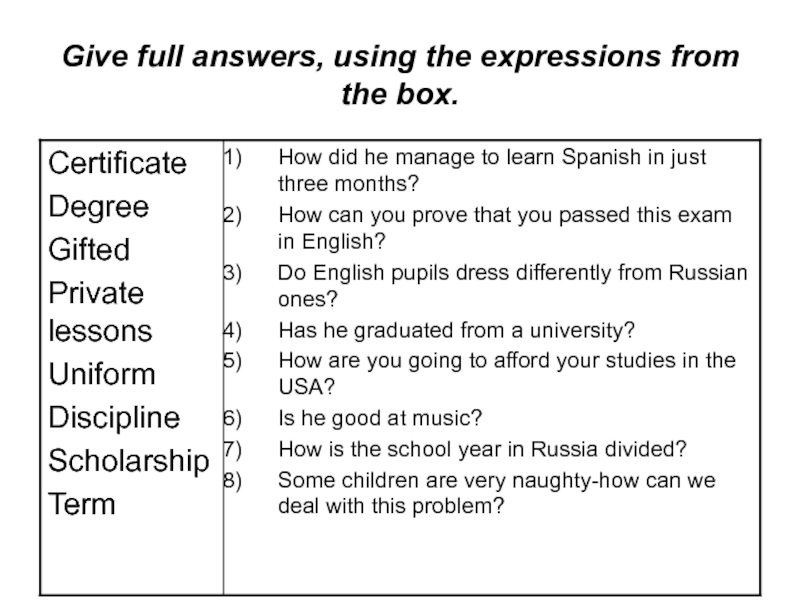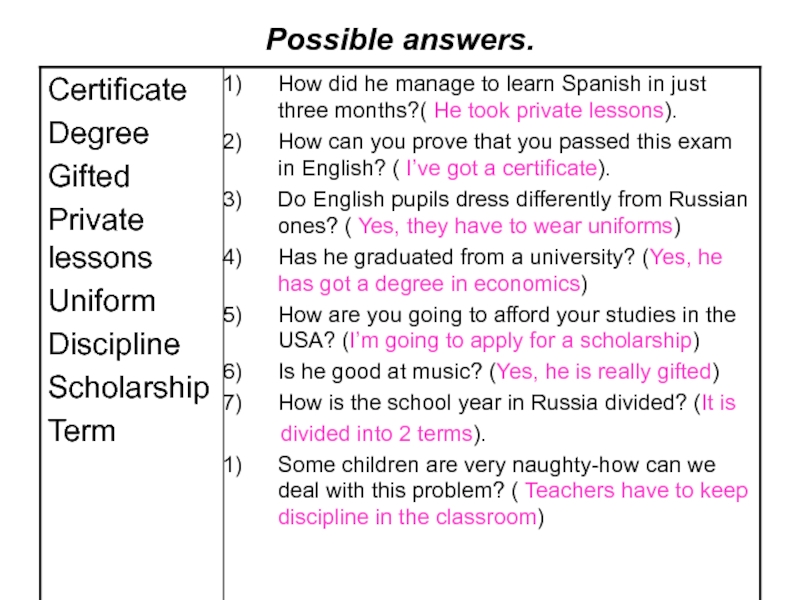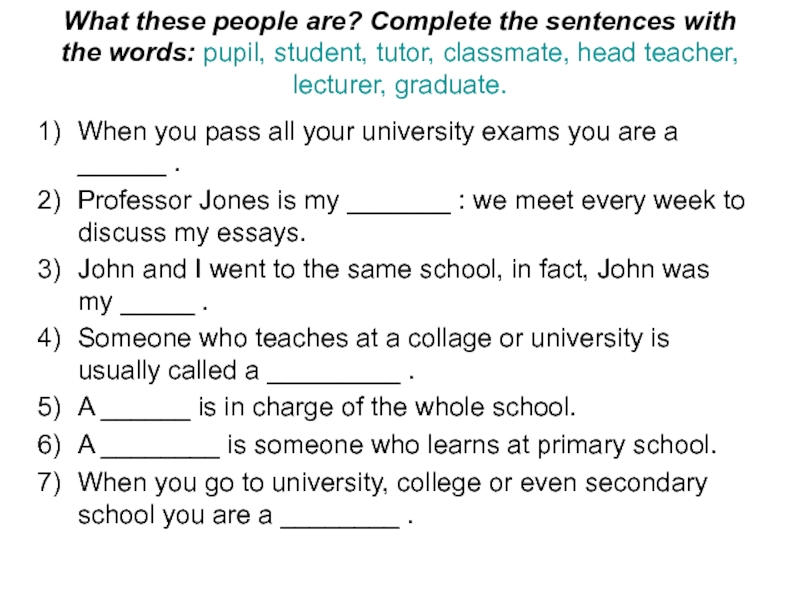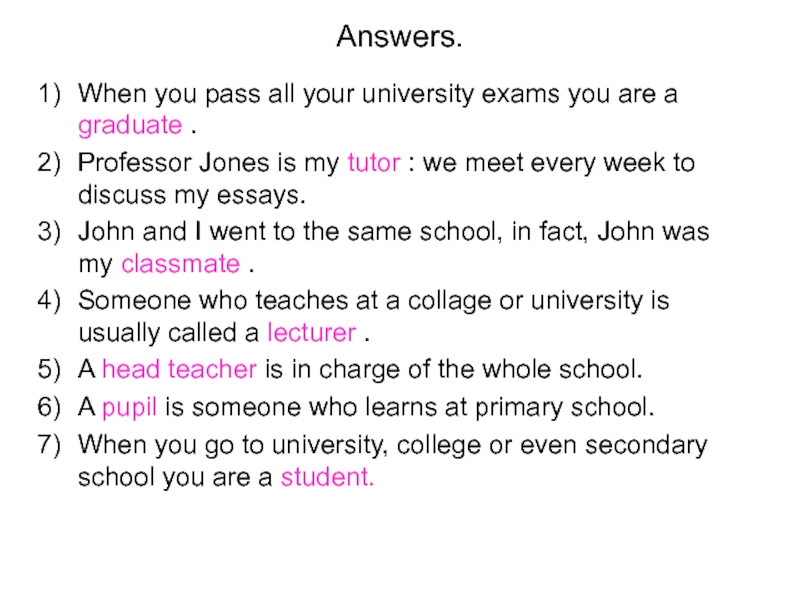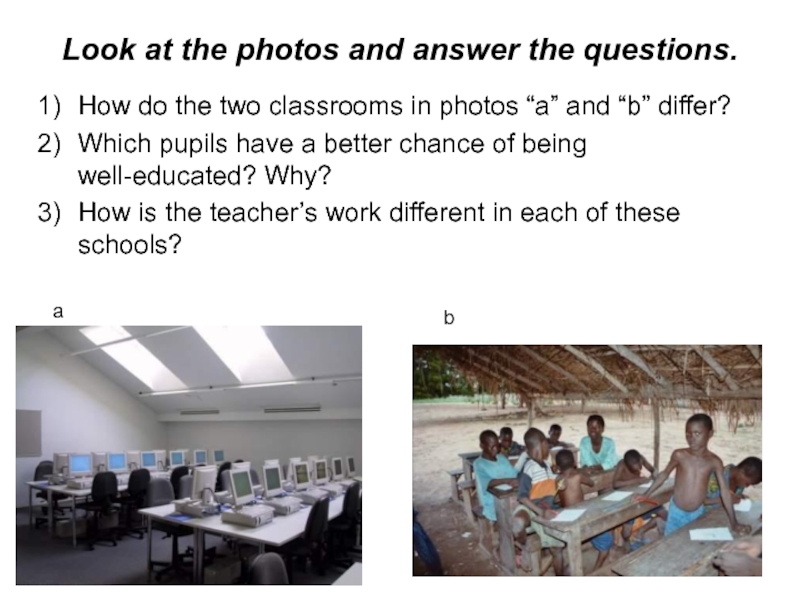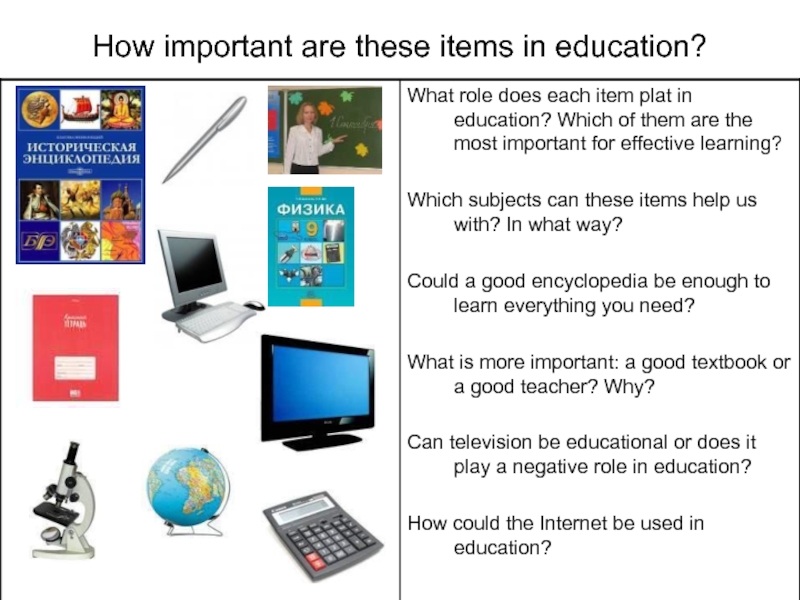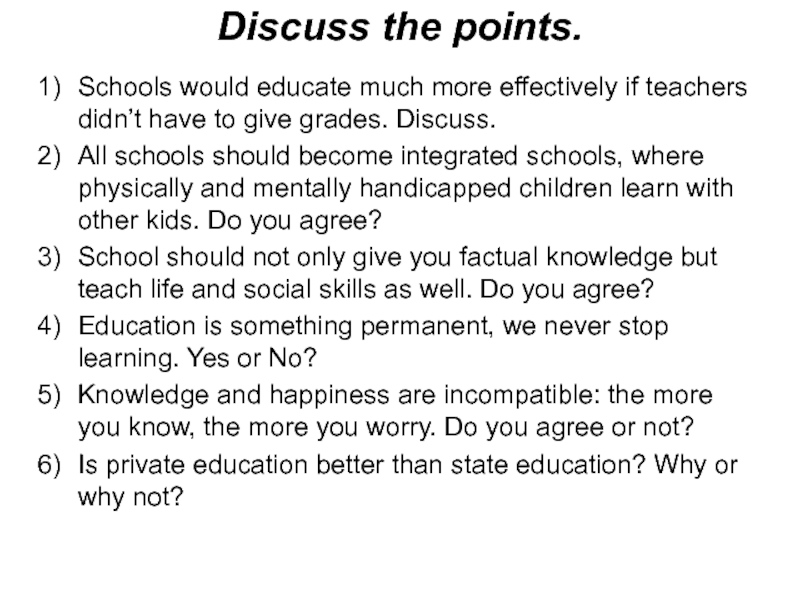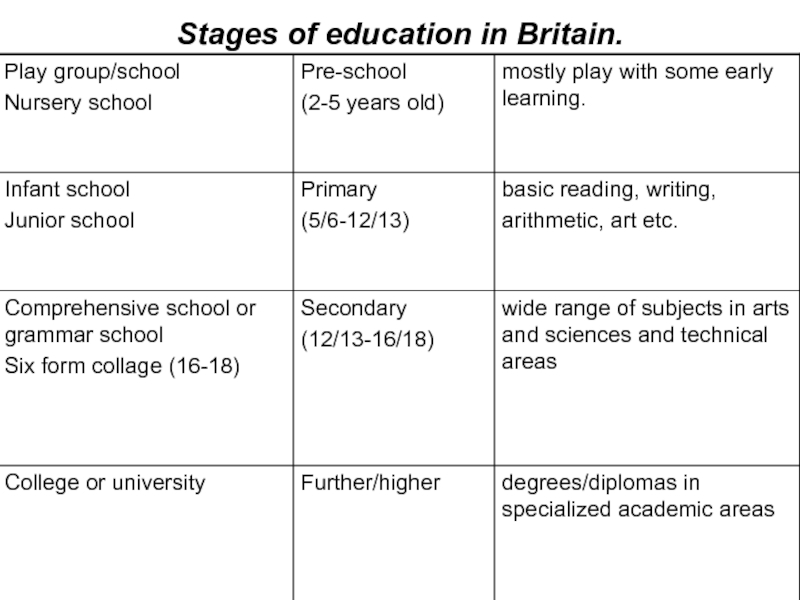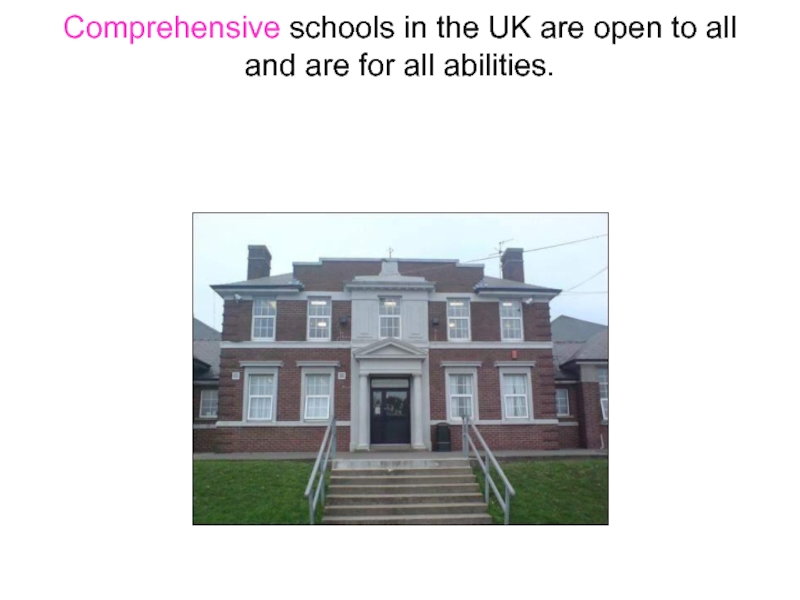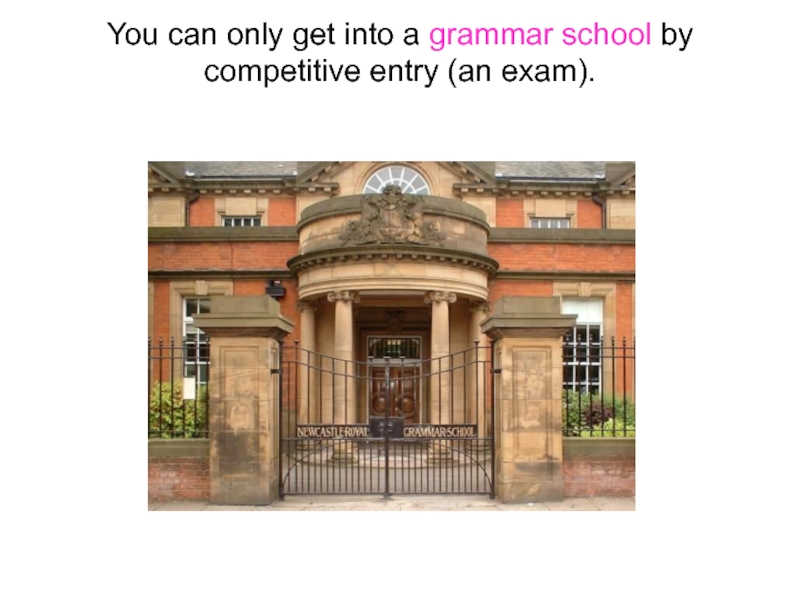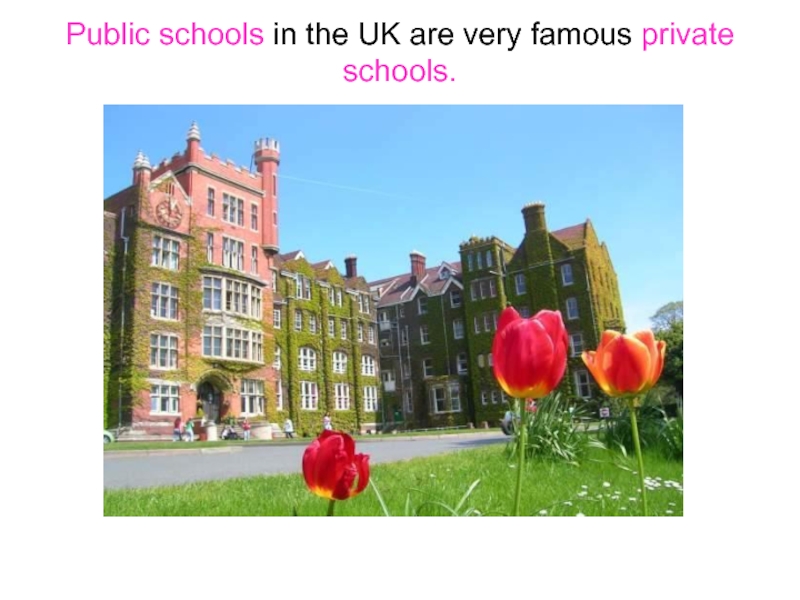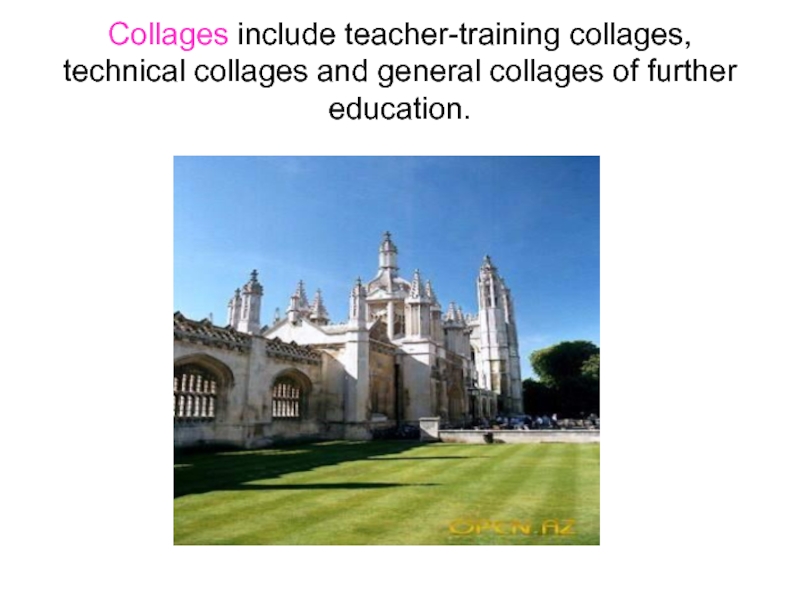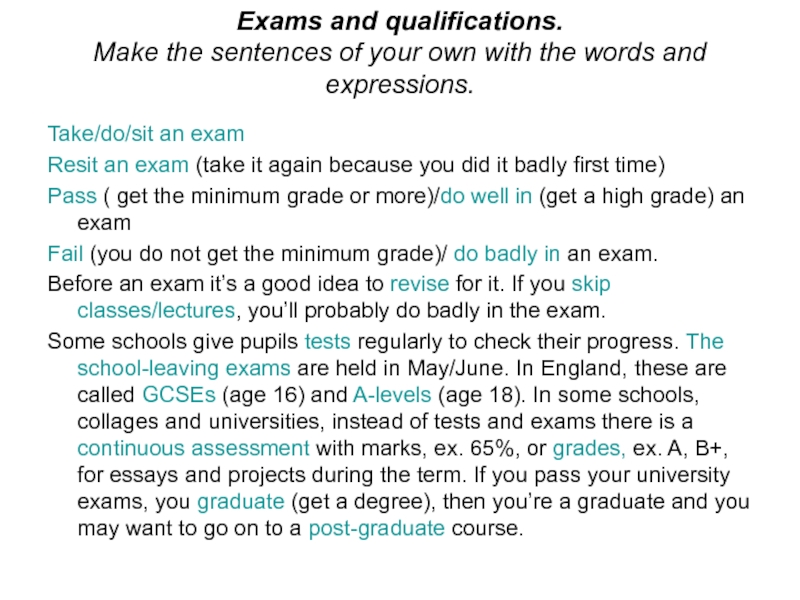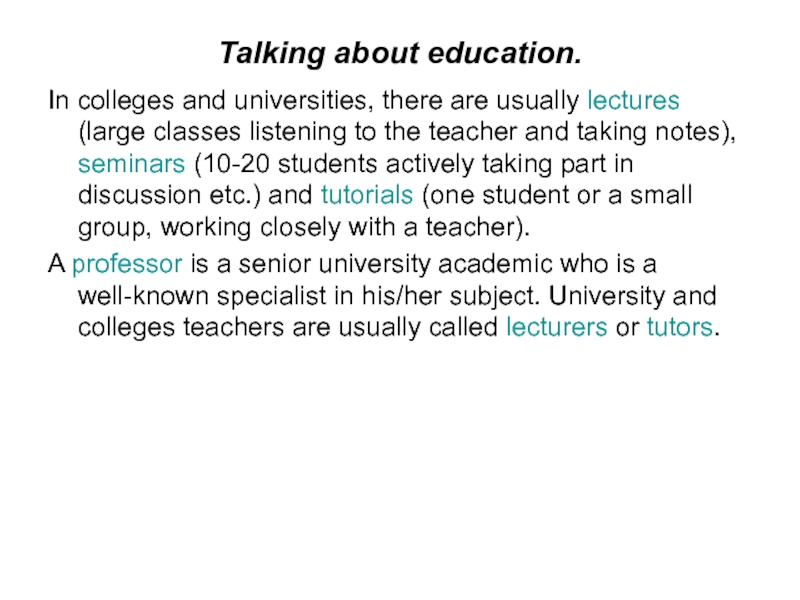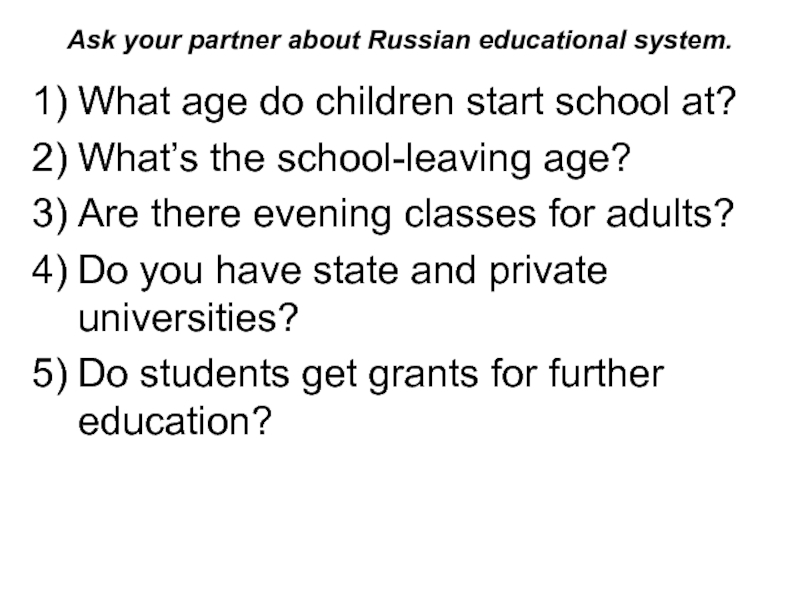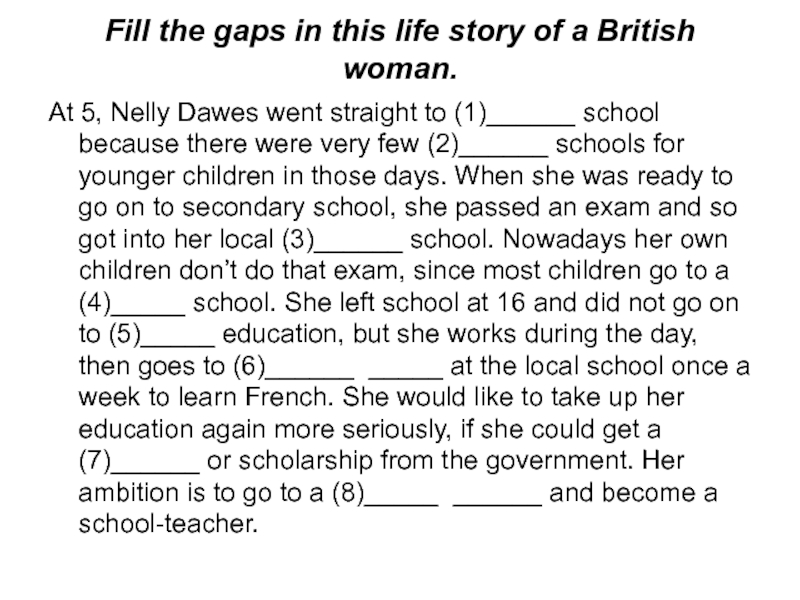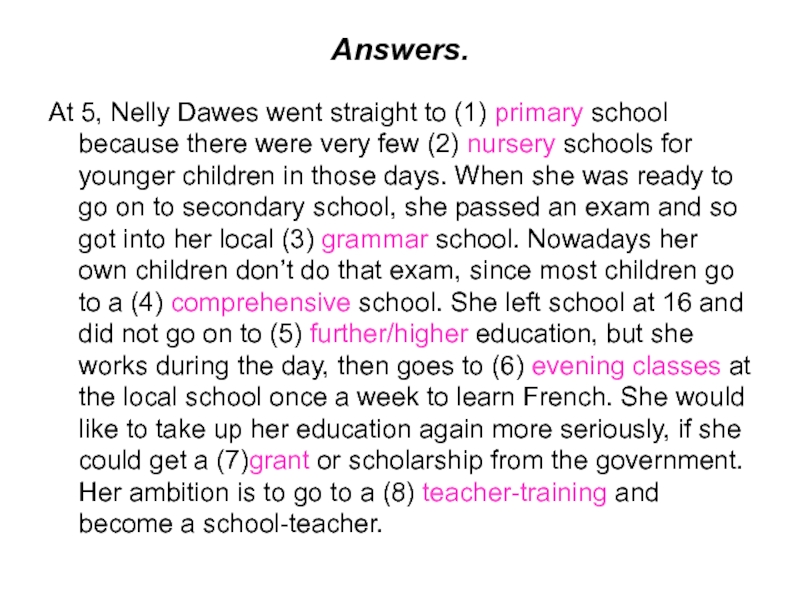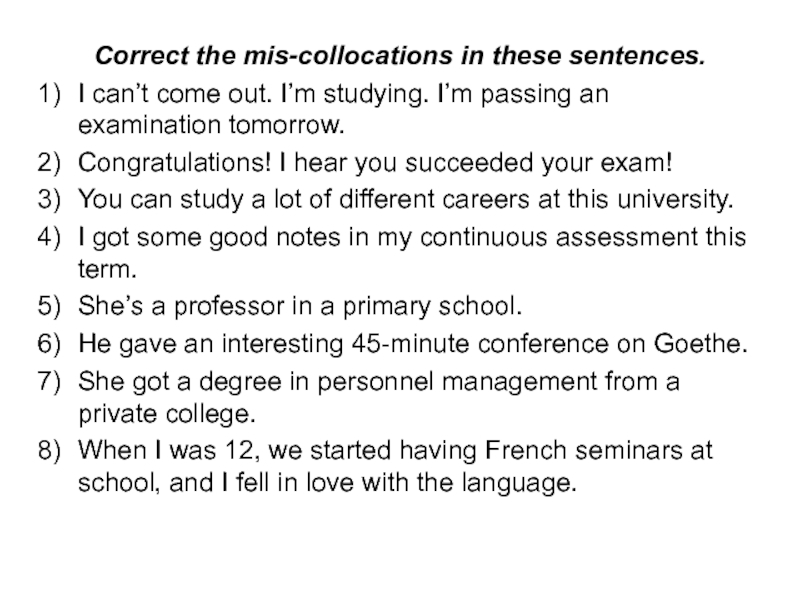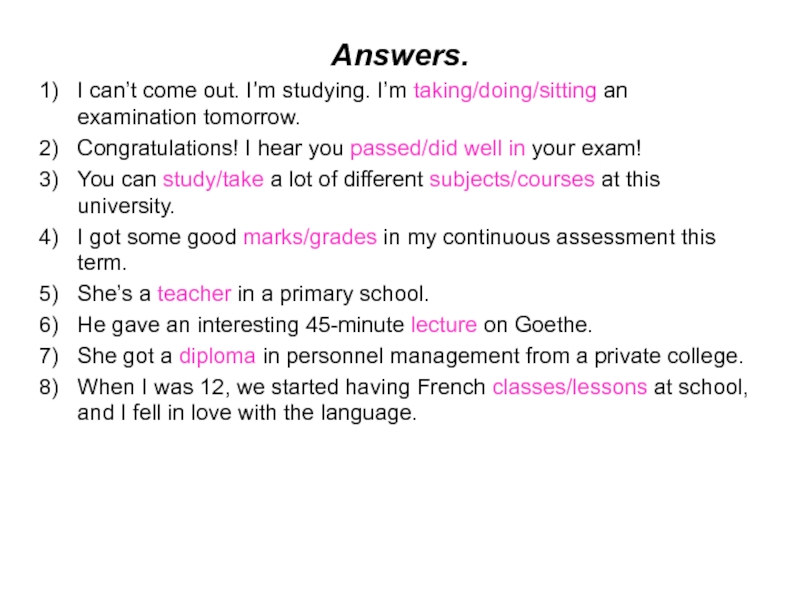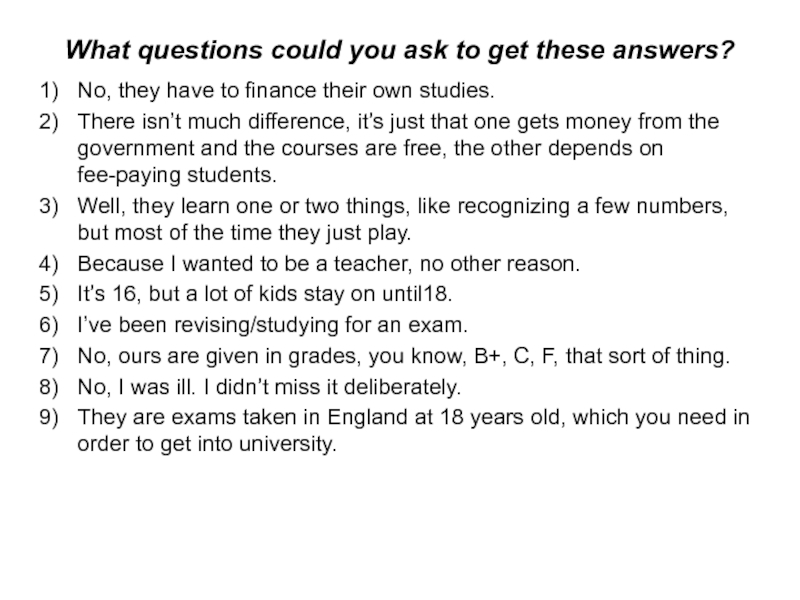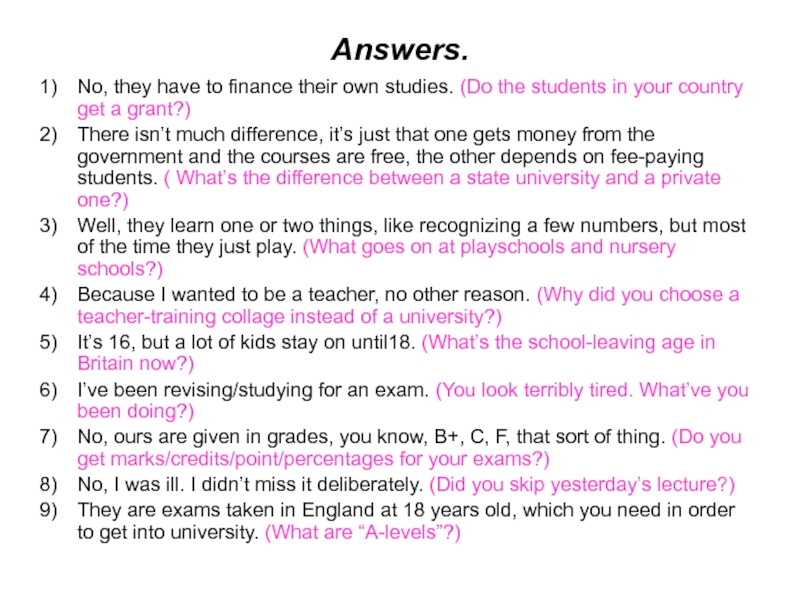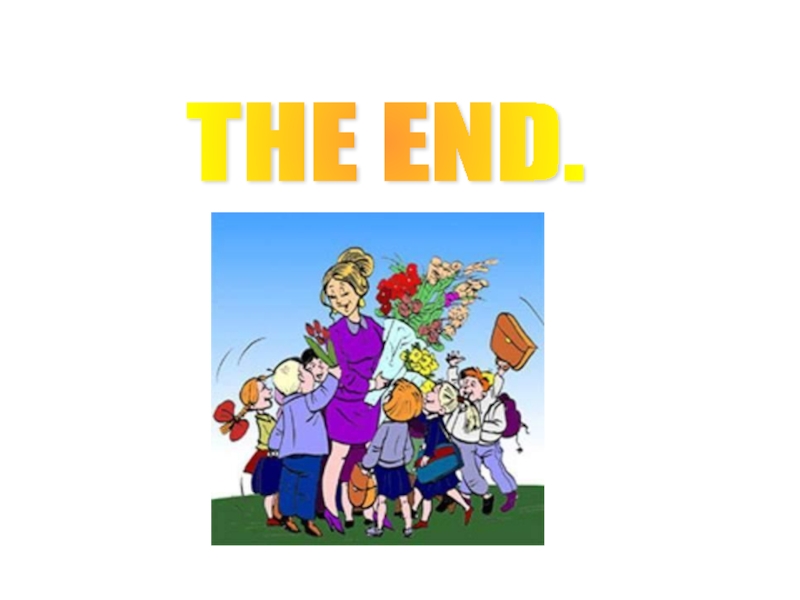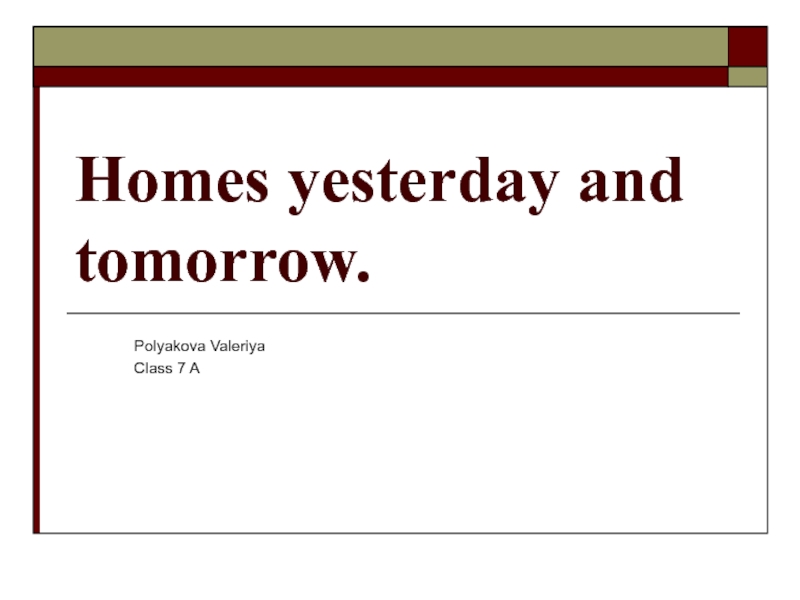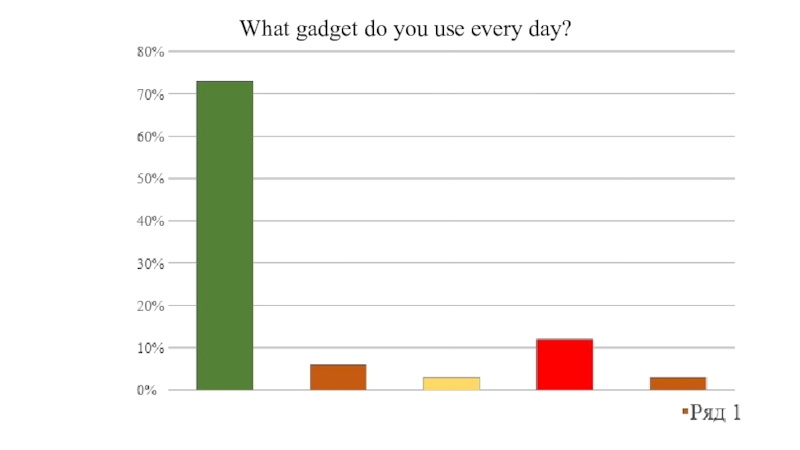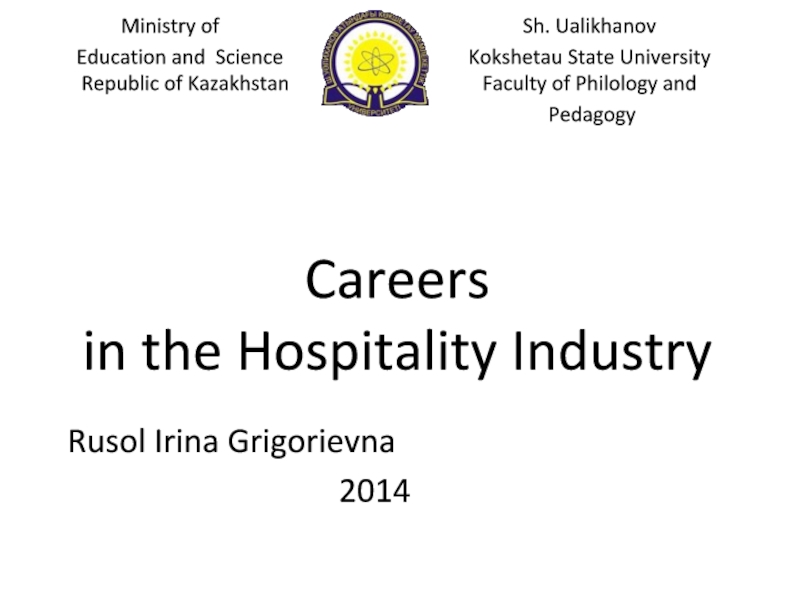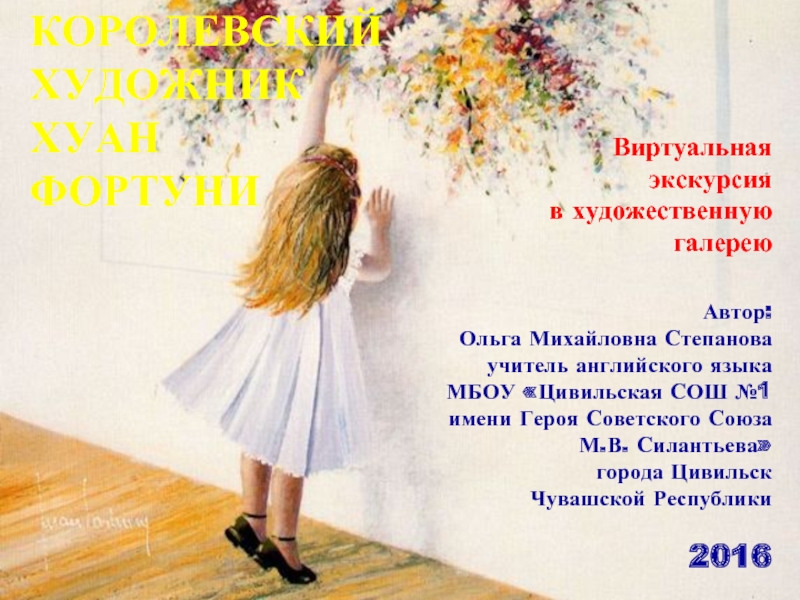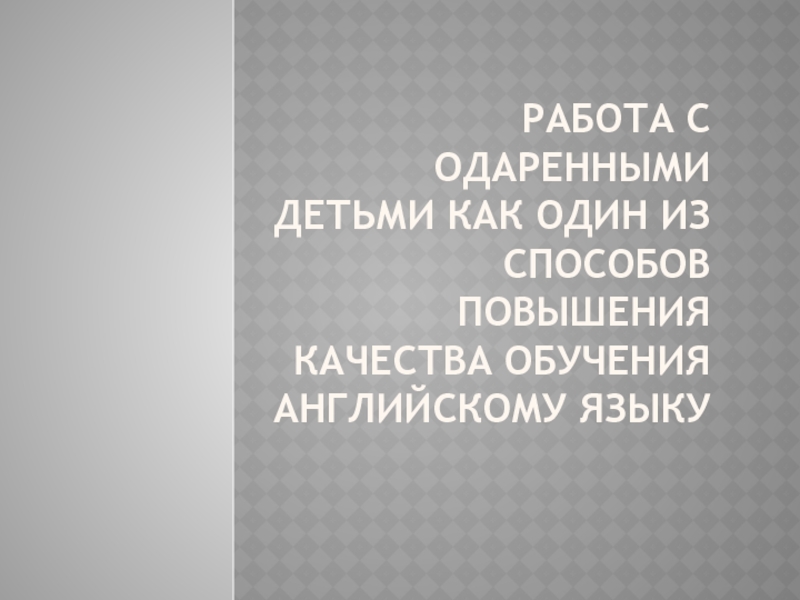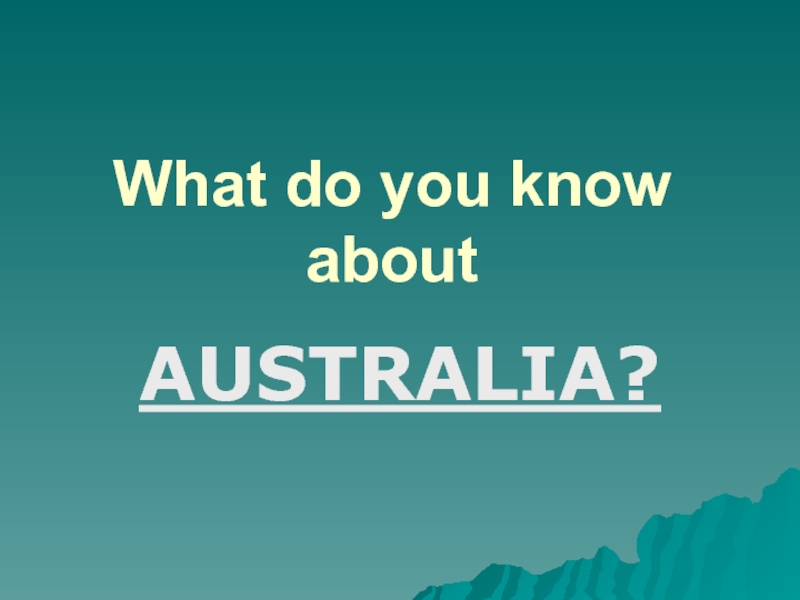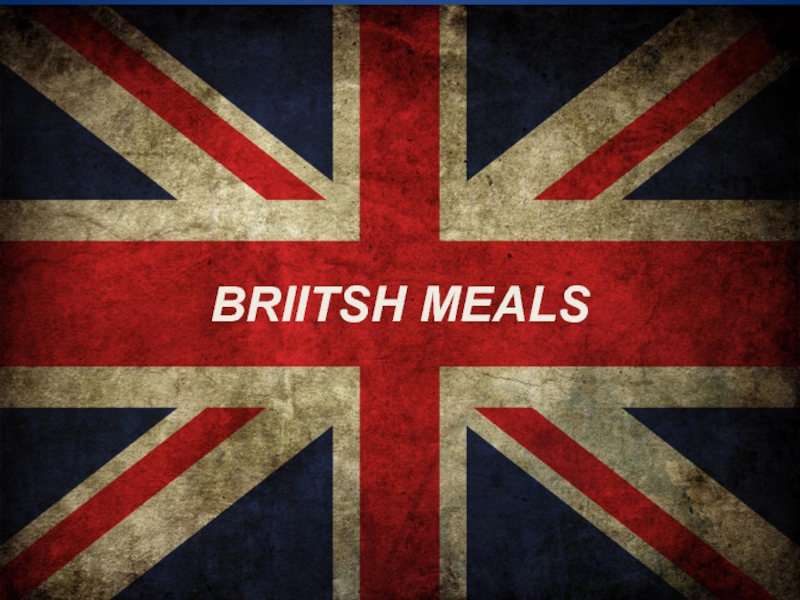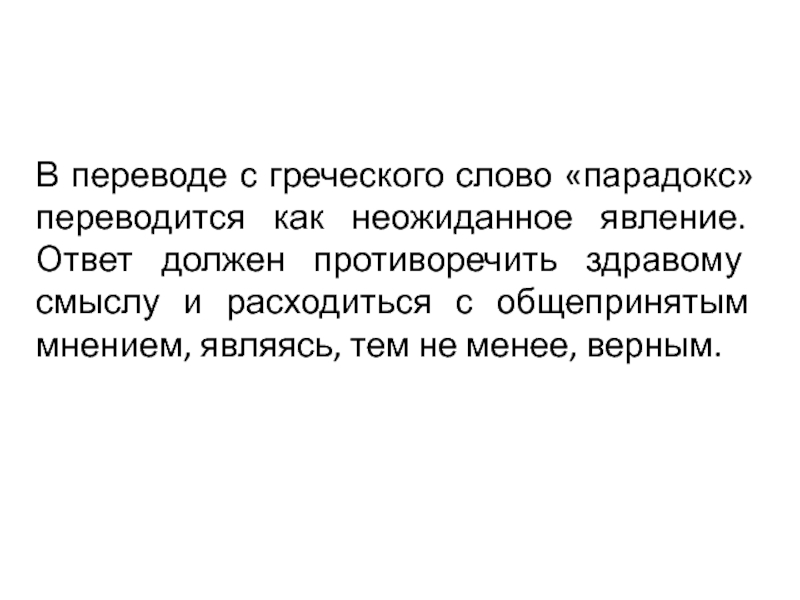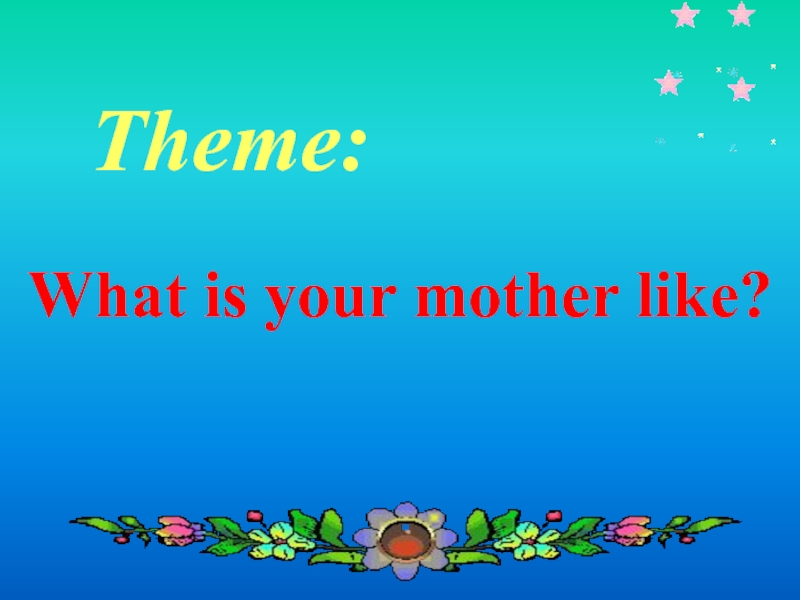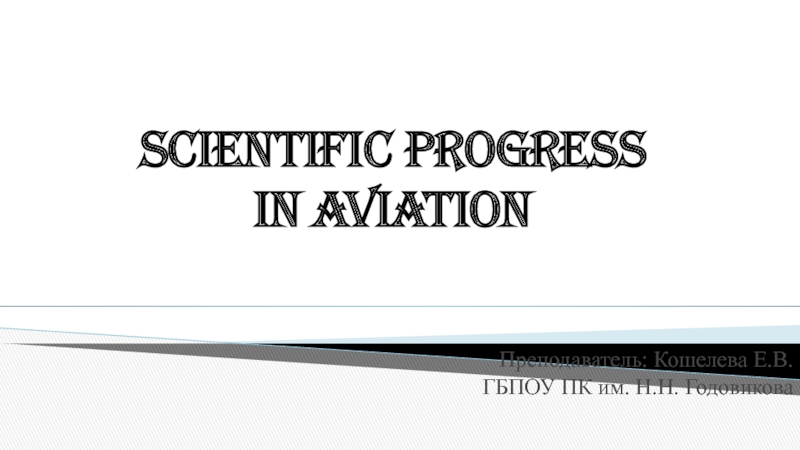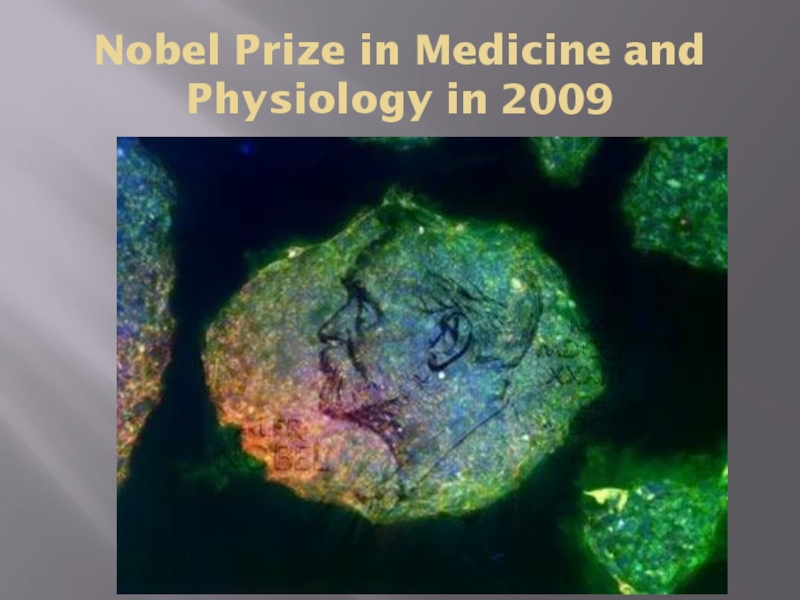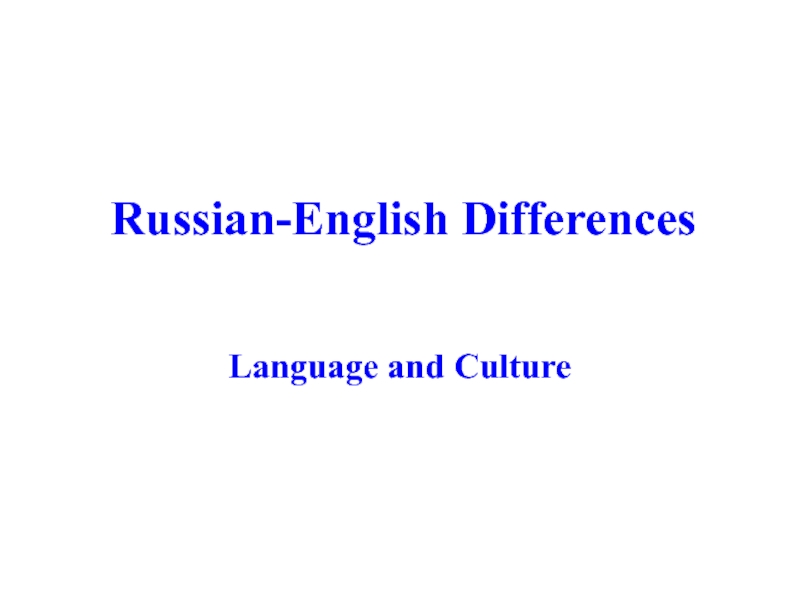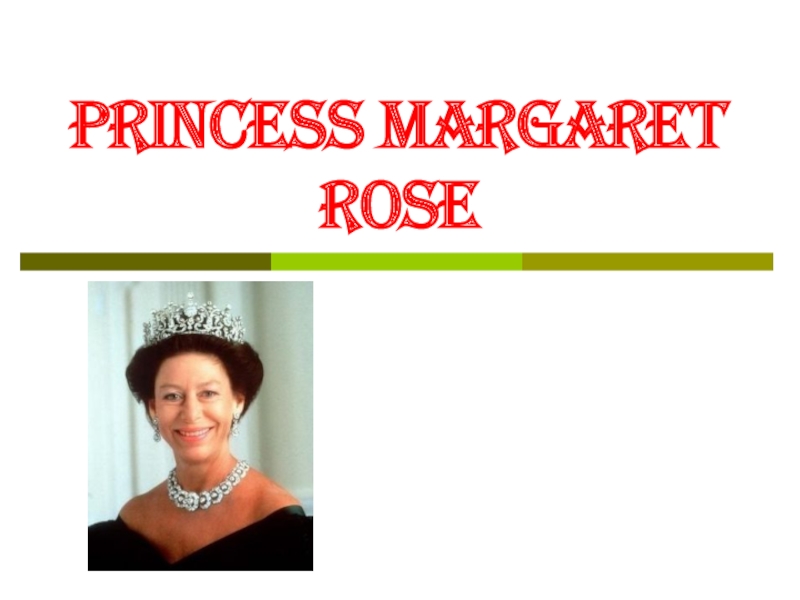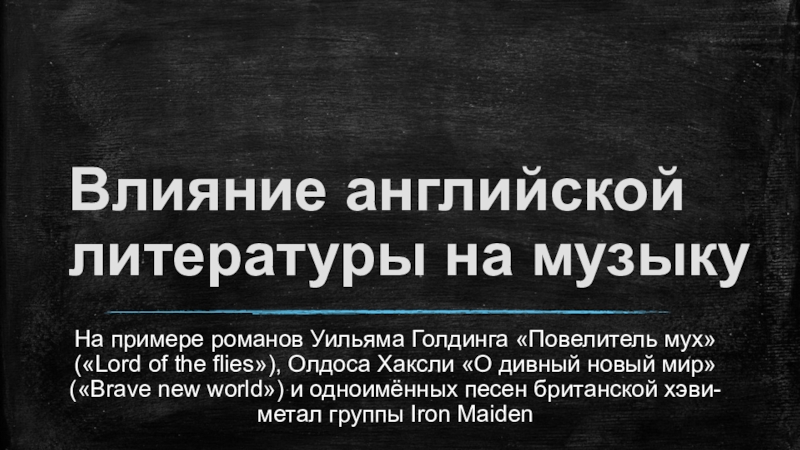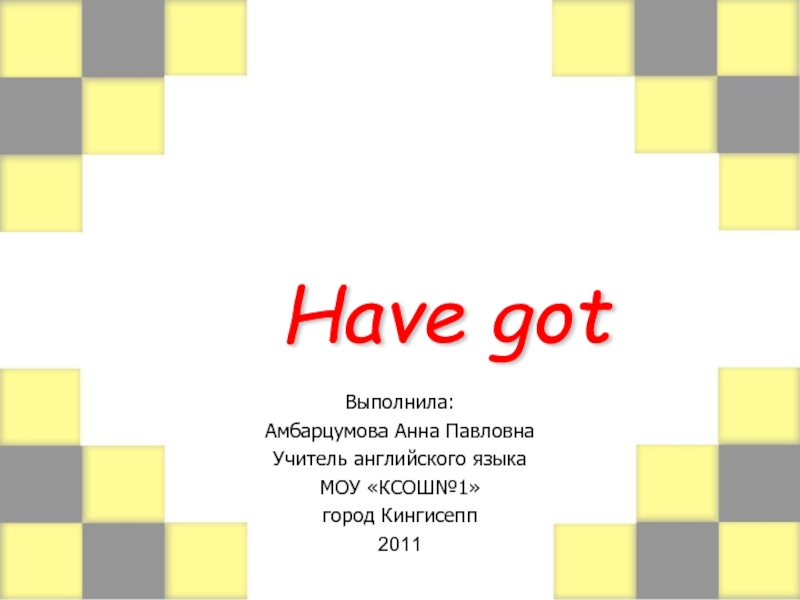Разделы презентаций
- Разное
- Английский язык
- Астрономия
- Алгебра
- Биология
- География
- Геометрия
- Детские презентации
- Информатика
- История
- Литература
- Математика
- Медицина
- Менеджмент
- Музыка
- МХК
- Немецкий язык
- ОБЖ
- Обществознание
- Окружающий мир
- Педагогика
- Русский язык
- Технология
- Физика
- Философия
- Химия
- Шаблоны, картинки для презентаций
- Экология
- Экономика
- Юриспруденция
Schools and education 11 класс
Содержание
- 1. Schools and education 11 класс
- 2. Answer the questions.What kind of school did
- 3. Look at the types of schools and
- 4. Look through the kinds of schools and
- 5. Complete the gaps with the necessary forms of the verbs.
- 6. Answers.
- 7. Match the verbs with the nouns to make up set-expressions.
- 8. Answers.takecourse inresearch intohomeworka degree in
- 9. Fill the gaps with prepositions “ in”,
- 10. Answers.When I was at school I liked
- 11. Give full answers, using the expressions from the box.
- 12. Possible answers.
- 13. What these people are? Complete the sentences
- 14. Answers.When you pass all your university exams
- 15. Look at the photos and answer the
- 16. How important are these items in education?
- 17. Discuss the points. Schools would educate much
- 18. Stages of education in Britain.
- 19. Comprehensive schools in the UK are open to all and are for all abilities.
- 20. You can only get into a grammar school by competitive entry (an exam).
- 21. Public schools in the UK are very famous private schools.
- 22. Collages include teacher-training collages, technical collages and general collages of further education.
- 23. Exams and qualifications. Make the sentences
- 24. Talking about education.In colleges and universities, there
- 25. Ask your partner about Russian educational system.What
- 26. Fill the gaps in this life story
- 27. Answers.At 5, Nelly Dawes went straight to
- 28. Correct the mis-collocations in these sentences.I can’t
- 29. Answers.I can’t come out. I’m studying. I’m
- 30. What questions could you ask to get
- 31. Answers.No, they have to finance their own
- 32. THE END.
- 33. Скачать презентанцию
Answer the questions.What kind of school did you go to?Was your school well or poorly equipped?Was the quality of teaching high?Did you have any problems with discipline?How many lessons a day
Слайды и текст этой презентации
Слайд 1Schools and education.
Презентация к уроку закрепления лексики
для 10-11 классов.
Преподаватель
: Андреева Н. И.
Слайд 2Answer the questions.
What kind of school did you go to?
Was
your school well or poorly equipped?
Was the quality of teaching
high?Did you have any problems with discipline?
How many lessons a day did you have?
Did you spend much time on your homework?
What was you favorite subject?
Were there any subjects you were bad at?
Were you taught computer skills?
What subjects do you think should be studied at school?
Did you take part in any out-of-class activities?
Were you on good terms with your teachers?
Did you get along with your classmates?
Слайд 3Look at the types of schools and put them in
order you attended them.
Upper secondary school
Primary school
Lower secondary school
College
Nursery school/play
groupUniversity
Слайд 4Look through the kinds of schools and answer the questions.
State
school (BrE)
Religious school
Single-sex school
Public school (BrE)
Boarding school
Vocational school
Слайд 9Fill the gaps with prepositions
“ in”, “at”.
When I was ____
school I liked history and geography? But I was particularly
good ___ maths.He has a degree ____ economics and maths.
My sister learns French ___ the French Institute in Moscow.
He studied ___ Novosibirsk University and then got a scholarship ___ Harvard.
I attend classes ____ painting.
I did a course ____ website design in July.
Слайд 10Answers.
When I was at school I liked history and geography?
But I was particularly good at maths.
He has a degree
in economics and maths.My sister learns French at the French Institute in Moscow.
He studied at Novosibirsk University and then got a scholarship at Harvard.
I attend classes in painting.
I did a course in website design in July.
Слайд 13What these people are? Complete the sentences with the words:
pupil, student, tutor, classmate, head teacher, lecturer, graduate.
When you pass
all your university exams you are a ______ .Professor Jones is my _______ : we meet every week to discuss my essays.
John and I went to the same school, in fact, John was my _____ .
Someone who teaches at a collage or university is usually called a _________ .
A ______ is in charge of the whole school.
A ________ is someone who learns at primary school.
When you go to university, college or even secondary school you are a ________ .
Слайд 14Answers.
When you pass all your university exams you are a
graduate .
Professor Jones is my tutor : we meet every
week to discuss my essays.John and I went to the same school, in fact, John was my classmate .
Someone who teaches at a collage or university is usually called a lecturer .
A head teacher is in charge of the whole school.
A pupil is someone who learns at primary school.
When you go to university, college or even secondary school you are a student.
Слайд 15Look at the photos and answer the questions.
How do the
two classrooms in photos “a” and “b” differ?
Which pupils have
a better chance of being well-educated? Why?How is the teacher’s work different in each of these schools?
a
b
Слайд 17Discuss the points.
Schools would educate much more effectively if teachers
didn’t have to give grades. Discuss.
All schools should become integrated
schools, where physically and mentally handicapped children learn with other kids. Do you agree?School should not only give you factual knowledge but teach life and social skills as well. Do you agree?
Education is something permanent, we never stop learning. Yes or No?
Knowledge and happiness are incompatible: the more you know, the more you worry. Do you agree or not?
Is private education better than state education? Why or why not?
Слайд 22 Collages include teacher-training collages, technical collages and general collages of
further education.
Слайд 23Exams and qualifications. Make the sentences of your own with
the words and expressions.
Take/do/sit an exam
Resit an exam (take it
again because you did it badly first time)Pass ( get the minimum grade or more)/do well in (get a high grade) an exam
Fail (you do not get the minimum grade)/ do badly in an exam.
Before an exam it’s a good idea to revise for it. If you skip classes/lectures, you’ll probably do badly in the exam.
Some schools give pupils tests regularly to check their progress. The school-leaving exams are held in May/June. In England, these are called GCSEs (age 16) and A-levels (age 18). In some schools, collages and universities, instead of tests and exams there is a continuous assessment with marks, ex. 65%, or grades, ex. A, B+, for essays and projects during the term. If you pass your university exams, you graduate (get a degree), then you’re a graduate and you may want to go on to a post-graduate course.
Слайд 24Talking about education.
In colleges and universities, there are usually lectures
(large classes listening to the teacher and taking notes), seminars
(10-20 students actively taking part in discussion etc.) and tutorials (one student or a small group, working closely with a teacher).A professor is a senior university academic who is a well-known specialist in his/her subject. University and colleges teachers are usually called lecturers or tutors.
Слайд 25Ask your partner about Russian educational system.
What age do children
start school at?
What’s the school-leaving age?
Are there evening classes for
adults?Do you have state and private universities?
Do students get grants for further education?
Слайд 26Fill the gaps in this life story of a British
woman.
At 5, Nelly Dawes went straight to (1)______ school because
there were very few (2)______ schools for younger children in those days. When she was ready to go on to secondary school, she passed an exam and so got into her local (3)______ school. Nowadays her own children don’t do that exam, since most children go to a (4)_____ school. She left school at 16 and did not go on to (5)_____ education, but she works during the day, then goes to (6)______ _____ at the local school once a week to learn French. She would like to take up her education again more seriously, if she could get a (7)______ or scholarship from the government. Her ambition is to go to a (8)_____ ______ and become a school-teacher.Слайд 27Answers.
At 5, Nelly Dawes went straight to (1) primary school
because there were very few (2) nursery schools for younger
children in those days. When she was ready to go on to secondary school, she passed an exam and so got into her local (3) grammar school. Nowadays her own children don’t do that exam, since most children go to a (4) comprehensive school. She left school at 16 and did not go on to (5) further/higher education, but she works during the day, then goes to (6) evening classes at the local school once a week to learn French. She would like to take up her education again more seriously, if she could get a (7)grant or scholarship from the government. Her ambition is to go to a (8) teacher-training and become a school-teacher.Слайд 28Correct the mis-collocations in these sentences.
I can’t come out. I’m
studying. I’m passing an examination tomorrow.
Congratulations! I hear you succeeded
your exam!You can study a lot of different careers at this university.
I got some good notes in my continuous assessment this term.
She’s a professor in a primary school.
He gave an interesting 45-minute conference on Goethe.
She got a degree in personnel management from a private college.
When I was 12, we started having French seminars at school, and I fell in love with the language.
Слайд 29Answers.
I can’t come out. I’m studying. I’m taking/doing/sitting an examination
tomorrow.
Congratulations! I hear you passed/did well in your exam!
You can
study/take a lot of different subjects/courses at this university.I got some good marks/grades in my continuous assessment this term.
She’s a teacher in a primary school.
He gave an interesting 45-minute lecture on Goethe.
She got a diploma in personnel management from a private college.
When I was 12, we started having French classes/lessons at school, and I fell in love with the language.
Слайд 30What questions could you ask to get these answers?
No, they
have to finance their own studies.
There isn’t much difference, it’s
just that one gets money from the government and the courses are free, the other depends on fee-paying students.Well, they learn one or two things, like recognizing a few numbers, but most of the time they just play.
Because I wanted to be a teacher, no other reason.
It’s 16, but a lot of kids stay on until18.
I’ve been revising/studying for an exam.
No, ours are given in grades, you know, B+, C, F, that sort of thing.
No, I was ill. I didn’t miss it deliberately.
They are exams taken in England at 18 years old, which you need in order to get into university.
Слайд 31Answers.
No, they have to finance their own studies. (Do the
students in your country get a grant?)
There isn’t much difference,
it’s just that one gets money from the government and the courses are free, the other depends on fee-paying students. ( What’s the difference between a state university and a private one?)Well, they learn one or two things, like recognizing a few numbers, but most of the time they just play. (What goes on at playschools and nursery schools?)
Because I wanted to be a teacher, no other reason. (Why did you choose a teacher-training collage instead of a university?)
It’s 16, but a lot of kids stay on until18. (What’s the school-leaving age in Britain now?)
I’ve been revising/studying for an exam. (You look terribly tired. What’ve you been doing?)
No, ours are given in grades, you know, B+, C, F, that sort of thing. (Do you get marks/credits/point/percentages for your exams?)
No, I was ill. I didn’t miss it deliberately. (Did you skip yesterday’s lecture?)
They are exams taken in England at 18 years old, which you need in order to get into university. (What are “A-levels”?)
